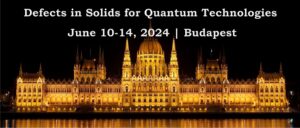The Adam Gali Group is offering new postdoctoral positions in the field of solid-state quantum information processing in the vibrant and charming city of Budapest. The team focuses on developing and applying ab initio methods to discover and characterize solid-state quantum bits, as well as designing quantum optics protocols for quantum computation, quantum communication, and quantum sensing. Our research delves into the in-depth analysis of electronic states of matter to uncover novel phenomena that can be leveraged for next-generation optoelectronics and quantum devices.
We collaborate with world-leading experimentalists as part of various European research projects, enabling direct validation of our simulation results in cutting-edge laboratories—both at partner institutions and at our host institute [1,2]. This synergy significantly advances the development of quantum technologies.
Excellent candidates have the unique opportunity to apply for the prestigious Marie Skłodowska-Curie Actions (MSCA) postdoctoral fellowship at Adam Gali’s research group coordinated by the Hungarian Academy of Sciences (https://momentummsca.mta.hu/).
Interested candidates should submit a motivation letter and two reference letters to Prof. Adam Gali at [email protected].
[1] A. Pershin et al., Nature Communications 16, 9797 (2025)
[2] P. Li et al., Nature Materials (2025), DOI: 10.1038/s41563-025-02382-9

